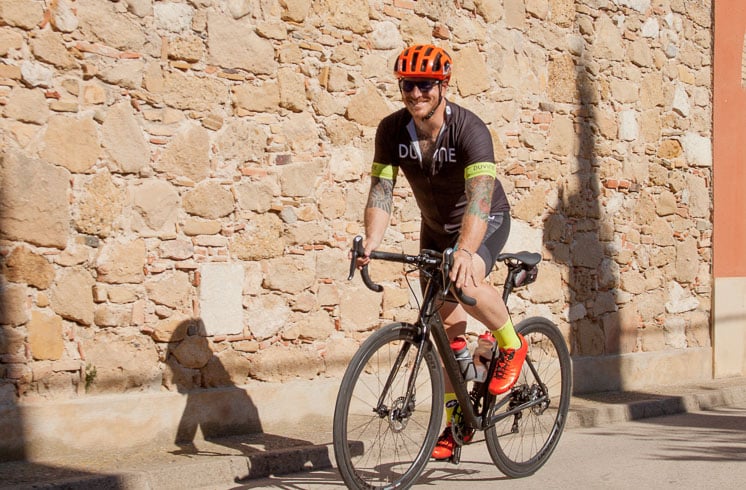This year, I invited our Chef on Wheels and my friend Seamus Mullen for the weekend to do what DuVine does best: bike and eat, with a touch of drinking and sleeping.
A Little Background on Our Chef
Seamus Mullen, Executive Chef at Tertulia and resident Chef on Wheels for DuVine (he has joined trips in Provence, the Dolomites, and across Central Italy), was an incredible partner in crime for our bro weekend. Seamus epitomizes the DuVine philosophy. A former bike racer, he grew up on an organic farm in Vermont and spent years perfecting his culinary skillset in Spain while embracing the culture of the country. Beyond his culinary expertise, Seamus has devoted himself to the crossroads of food and health beyond the realm of traditional nutrition. In 2007 he was diagnosed with Rheumatoid Arthritis, and after battling the autoimmune disease through modern medicine with little success, focused on his own eating patterns to turn the disease around.


Health + Nutrition + Me
Health and nutrition are important to me, as they should be to any cyclist. When you spend hours in the saddle, you need to nourish yourself properly so you can pedal at your best. Seamus knows how important our diets are, and his unparalleled experience as a gourmet chef and athlete, combined with his study of nutrition regarding his own experience with illness makes him an amazing teacher. Nutrition is not a fad. Being healthy is always in vogue and will continue to be. It’s important to understand how to eat to optimize your performance as a cyclist, or how to stay energized and alert even if most of your day is spent in an office.

My Weekend with Seamus
We spent our weekend eating at some fantastic restaurants, Bird Dog and SPQR, and cycling with some of DuVine’s top California guests and pros. But watching Seamus put together a meal was incredible; there’s great focus that he puts into every step, yet creativity shines through on his canvas in the kitchen. Preparation is critical, and he spent hours the day before the meal on the prep work that goes into cooking.
For paella, he cooked a lobster stock from scratch, turning the remaining lobster into bite-sized appetizers, so he could control every ingredient he shared with the dinner party. The seafood was as fresh as can be, and the olive oil was exquisite—Seamus cuts no corners to deliver perfection at the table.
What I Learned
The best part of my weekend (besides the food) was learning alongside Seamus as he shared his wealth of knowledge about health and eating well. As we worked our way through the weekend, Seamus taught me so much about how to eat. Here are my takeaways.

1 | Focus on Fats
It’s one thing to follow dietary guidelines from a book or an article, but when Seamus told me what he eats I was surprised at the content. He barely eats breakfast in the morning, but saves his first meals of the day for lunch. If he does do breakfast, he tells me it focuses on vegetables and proteins, particularly eggs. The rest of the day, vegetables and meat fill him up. He avoids carbohydrates (unless making his famous paella) and legumes, as he considers them incomplete proteins unless combined with grains.
Seamus doesn’t believe that a diet low in fats is positive. Anytime you eat something branded low-fat, he says, the fat content has simply been replaced with more sugars, or carbs—empty calories that will spike your blood sugar but don’t actually leave you feeling full.
I felt great each day in California, following Seamus’ meal guidelines. I’d start my morning with eggs and sautéed seasonal vegetables on the side. He also loves bacon! It was delicious and left me ready to conquer the climbs in California.

2 | Eat what makes you feel good
It’s important to listen to your body, says Seamus, when deciding what to eat. His books Hero Food and Real Food Heals focus on cooking delicious food with ingredients that are good for your body. Olive oil, a staple in Spanish cuisine, is both delicious and has important anti-inflammatory properties. While Seamus always understood the flavor benefits of olive oil, he says he doubted the hype until he decided to experiment with cutting olive oil from his diet completely. Within a few days, his joints were causing unusual pain. The ability to listen to your body and the power to couple that intuition with eating the right ingredients is essential to a delicious diet that’s also healthy.

OLYMPUS DIGITAL CAMERA

3 | Add Wine
What about alcohol? DuVine’s raison d’être is to bring our guests by bike through famous wine regions. Can this be part of a healthy diet? I was glad to hear the answer was a resounding yes. Seamus cited the research of Dan Buettner, a National Geographic Explorer who spent years researching the small communities around the world with the highest density of centenarians (those who reach 100 years old). These communities are found in Greece, Sardinia, Japan, California, and Costa Rica. While their principle diets share few specific recipes, the biggest commonality is that these communities consume alcohol on a regular basis. “Alcohol does one thing; it’s an incredible grease for conversation, which causes socialization,” says Seamus. “Socializing is probably the most important factor in living a long and healthy life.” So relax and raise a glass of wine with friends, knowing that you are investing in your own longevity!




